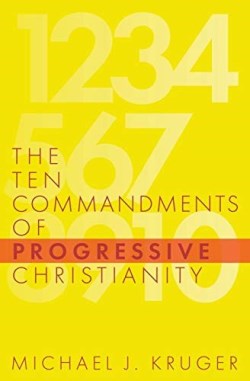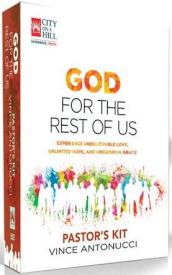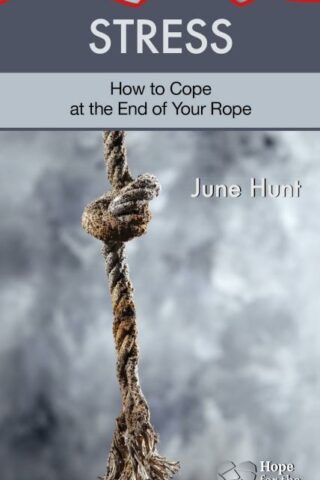10 Commandments Of Progressive Christianity
$7.99
A cautionary look at ten dangerously appealing half-truths.
In 1923, J. Gresham Machen, then a professor at Princeton Seminary, wrote his classic text, Christianity and Liberalism. The book was a response to the rise of liberalism in the mainline denominations of his own day. Machen argued that the liberal understanding of Christianity was, in fact, not just a variant version of the faith, nor did it represent simply a different denominational perspective, but was an entirely different religion. Put simply, liberal Christianity is not Christianity.
What is remarkable about Machen’s book is how prescient it was. His description of liberal Christianity–a moralistic, therapeutic version of the faith that values questions over answers and being “good” over being “right”–is still around today in basically the same form. For this reason alone the book should be required reading, certainly for all seminary students, pastors, and Christian leaders.
Although its modern advocates present liberal Christianity as something new and revolutionary, it is nothing of the sort. It may have new names (e.g., “emerging” or “progressive” Christianity), but it is simply a rehash of the same well-worn system that has been around for generations.
The abiding presence of liberal Christianity struck me not long ago when I came across a daily devotional from Richard Rohr that listed ten principles he thinks modern Christianity needs to embody. These ten principles are actually drawn from Philip Gulley’s book, If the Church Were Christian: Rediscovering the Values of Jesus. In that devotional series, ironically titled “Returning to Essentials,” Rohr sets forth the ten principles as a kind of confessional statement of modern liberalism (while at the same time pretending to deplore confessional statements). They are, in effect, a Ten Commandments for progressive Christianity.
Indeed, these ten sound like they were gathered not so much on the mountaintop as in the university classroom. They are less about God revealing his desires and more about man expressing his own–less Moses, more Oprah.
But take note: each of these commandments is partially true. Indeed, that is what makes this list, and progressive Christianity as a whole, so challenging. It is a master class in half-truths that sound appealing on the surface until you dig down deeper and really explore their foundations and implications. Benjamin Franklin was right when he quipped, “Half the truth is often a
in stock within 3-5 days of online purchase
SKU (ISBN): 9781949253214
ISBN10: 194925321X
Michael Kruger
Binding: Trade Paper
Published: November 2019
Cruciform Quick
Publisher: Cruciform Press
Print On Demand Product
Related products
-
I Still Believe Small Group DVD Kit
$39.99The I Still Believe Small Group Kit combines a 5-episode DVD series, 35-day devotional journal, and thorough leader’s guide to serve as a five-week guided tour for small groups through the biblical response to commitment, sacrifice, grief, loss, and also God’s sovereignty and redemption. This kit comes as a ready-to-use package that makes it easy to implement small groups in your church or ministry.
Includes: Video Series, Leader’s Guide, and Study Journal
Add to cartin stock within 3-5 days of online purchase
-
7 Last Words
$18.99Based on his talks at New York’s St. Patrick’s Cathedral on Good Friday 2015, the New York Times bestselling author and editor at large of America magazine offers a portrait of Jesus, using his last words on the cross to reveal how deeply he understood our predicaments, what it means to be fully human, and why we can turn to Christ completely, in mind, heart, and soul.
Each meditation is dedicated to one of the seven sayings:
*”Father, forgive them, for they do not know what they do.”
*”Today you will be with me in Paradise.”
*”Woman, this is your son” . . . “This is your mother.”?
*”My God, my God, why have you forsaken me?”?
*”I thirst.”?
*”It is finished.”?
*”Father, into your hands I commend my spirit.”With the warmth, wisdom, and grace that infuse his works, Father James Martin explains why Jesus’s crucifixion and death on the cross is an important teaching moment in the Gospels. Jesus’s final statements, words that are deeply cherished by his followers, exemplify the depth of his suffering but also provide a key to his empathy and why we can connect with him so deeply.
Add to cart1 in stock
-
God For The Rest Of Us Pastors DVD Kit
$19.99The Pharisees called Jesus “a friend of sinners.” He took it as a compliment. Would you? In these resources, Pastor Vince Antonucci and his unusual church that reaches out to people on the Las Vegas Strip explore a powerful question: what if God is not just for the faithful, church-going, or holier-than-thou types – what if God is for the rest of us? This small group study expands viewpoints, overcomes stereotypes, and models how to really love people like Jesus does. The Pastor’s Kit includes everything needed to plan a six-week teaching series around the concepts presented in the Small Group Study. It includes:
Special video message for pastors
Video guide for implementing a church-wide program
Six sermon outlines
Six short video clips to accompany each week’s sermon
Six sermon bumpers (short video clips to introduce each week’s sermon)
Digital art files to use in creation of bulletins and other promo materialsAdd to cartin stock within 3-5 days of online purchase
















Reviews
There are no reviews yet.